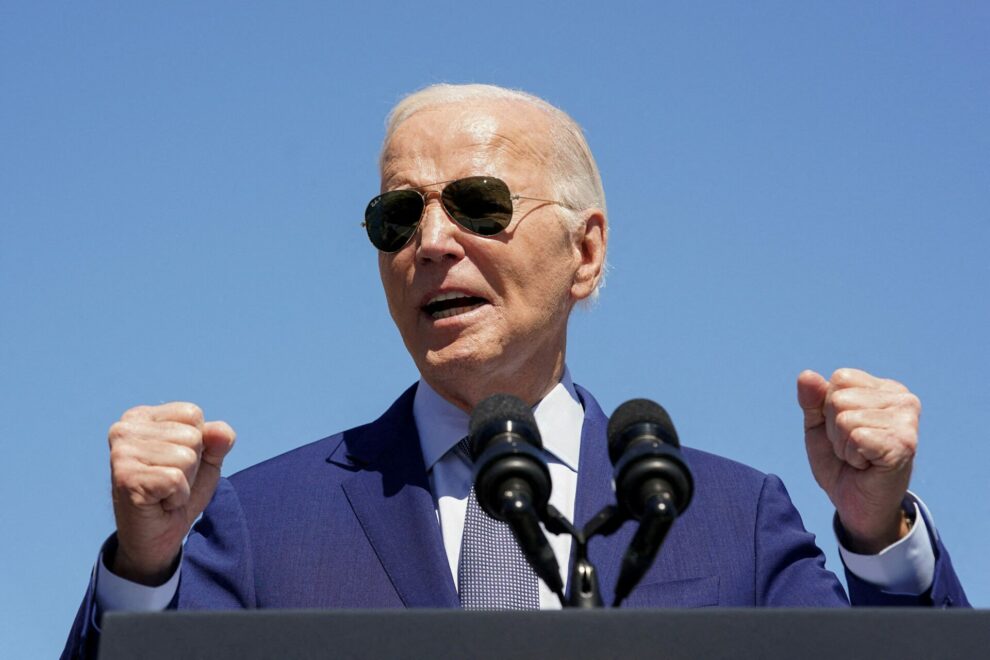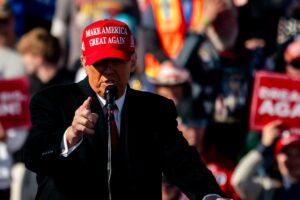The U.S. Federal Reserve looks on track to cut interest rates as the presidential campaign season heats up, potentially delivering President Joe Biden a boost as polls show Americans dislike his handling of the economy.
The Fed could play an outsized – and potentially uncomfortable – election-year role by helping shape attitudes about stubbornly high inflation and mounting housing costs that have been a drag on Biden’s reelection efforts. Rate cuts will also invite critics – Republican challenger Donald Trump chief among them – to argue an agency set up to be an independent monetary authority is tipping the political scales toward Biden.
Indeed, Trump isn’t even waiting for the first rate cut to happen before making that claim, telling Fox Business last month he expects Fed Chair Jerome Powell – whom Trump installed as central bank chief in 2018 and soured on soon afterward – “to do something to probably help the Democrats … if he lowers interest rates.”
Trump’s angst – and Biden’s likely optimism – over the matter is understandable given the hefty mindshare interest rates have come to claim among consumers fatigued and angered by enduring the steepest inflation since the Reagan administration.
“Rate cuts are massively popular with people. It will really help build confidence in the economy just as people are paying closer attention to the election,” said Celinda Lake, a top Biden pollster in his 2020 campaign who has recently done private polls on the Fed for a client. “People are really feeling like they are being gouged every way to Sunday.”
Too slow to matter?
Americans in poll after poll rank the economy at or near the top of their most important election-year issues, and the outlook U.S. central bankers sketched at last week’s meeting is rather a rosy one for Biden. Officials’ projections suggest he will ride a growing economy, low unemployment, moderating inflation, and also cheaper credit into Election Day on Nov. 5.
Investors now anticipate rate cuts at two of the four Fed meetings between now and then, in mid-June and again in mid-September, decisions that Biden could then point to as evidence the worst of inflation has passed and that could influence voter perceptions of the economy.
Though the Fed only controls an overnight borrowing rate among banks, reductions to that benchmark – set at 5.25%-to-5.50% since last July – translate quickly to lower mortgage rates, cheaper car loans and easier financing terms for small businesses. The question is whether what is anticipated – roughly half a percentage point of reductions before voters go to the polls – will be sufficient to move the needle.
Lindsay Owens, head of the Groundwork Collaborative, a progressive Washington think tank, is skeptical that it will. With the unemployment rate low, the economy growing at a strong pace and inflation still a concern, the Fed will cut rates too slowly to aid Biden all that much politically, she said.
“We’re in a 23-year-high interest rate environment and getting another 25-basis point cut or two before November doesn’t change the fact that mortgage rates are going to be high,” Owens said.
‘That little outfit’
Polls repeatedly show Americans give Biden poor ratings for his handling of the U.S. economy, due in large part to rising costs for groceries, gasoline and other necessities that have squeezed the poor and middle class. Biden has spent large parts of the last year touting the strong economy, but the effort has done little to change Americans’ negative attitudes.
The University of Michigan’s widely followed Consumer Sentiment Index plunged to a record low in June 2022 as inflation raged at a four-decade high of 9.1%. Sentiment is now about halfway between that and its pre-pandemic averages.
The developing dynamic between Biden, the economy and the Fed is in contrast to what former presidents Jimmy Carter and George H. W. Bush faced in the late 1970s and early 1990s, when inflation and Fed rate hikes arguably hurt their reelection chances. Both lost.
For the Fed, the current outlook, if it meets expectations, would be a singular triumph of its own. Aggressive rates hikes during 2022 and 2023 brought a punishing bout of inflation under control without causing a recession, and now a turn to rate cuts may be as close as the central bank comes to a declaration of victory.
Biden offered a preview of sorts of how he will incorporate Fed decisions during a campaign stop in Philadelphia earlier this month. He talked about his efforts to lower housing costs for Americans and made a prediction.
“I can’t guarantee it, but I’ll bet you — I’ll bet you those rates come down more because I bet you that little outfit that sets interest rates is going to come down,” Biden said.
The White House later clarified that Biden was offering his view of the economy, not making recommendations to the independent Fed, underscoring the political tightrope Biden and his campaign must walk when talking about the central bank.
‘Bidenflation’
Republicans have used the Fed’s rate hikes to bludgeon Biden, seeking to tether them to his mismanagement of the economy.
“Under Joe Biden, the Fed hiked interest rates to the highest level in 23 years – making life harder for families already struggling with the impact of Bidenflation,” said Republican National Committee spokesperson Anna Kelly.
Trump, who has his own tangled history with Powell, will no doubt take note of any rate cuts. He promoted Powell, a Fed governor at the time, to chair, but quickly clashed with him for raising interest rates – accusing him of trying to wreck the economy and at one point all but declaring him an enemy of the people.
Trump has made pinning the blame for inflation on Biden a key feature of his campaign rallies, and has not hesitated to paint Powell as a political actor who will take an action that could benefit his Democratic rival.
In his Fox Business interview with Maria Bartiromo last month, Trump said he believed Powell was looking to cut rates “for the sake of maybe getting people elected.”
North Carolina State economics professor Michael Walden has some advice for Powell, who faces hectoring from one camp or the other regardless of what the Fed ultimately does with rates.
“Whatever the source of criticism, Chairman Powell should be ready to cover his ears in the coming months,” he said.
Source: The Telegraph















